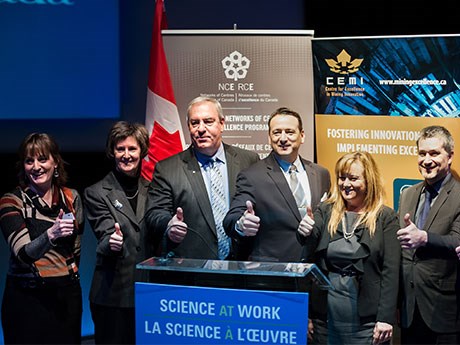The Centre for Excellence in Mining Innovation (CEMI) has received $15 million in federal funding for its Ultra Deep Mining Network.
Minister of State for Science and Technology Greg Rickford made the announcement January 22 at Science North’s Vale Cavern, where representatives from CEMI and Vale said the funding will help address the challenges posed by mining deeper than 2.5 kilometres.
The CEMI project was one of four organizations to receive funding this year from the government’s Business-led Networks of Centres of Excellence program.
“Clearly, Sudbury is going to be the face of ultra deep mining research,” said Rickford. “We think this kind of research isn’t just important to improve the effectiveness of deep mining and safety, but it also creates jobs.”
Doug Morrison, CEMI’s president and CEO, said that in addition to the government’s contribution, the Ultra Deep Mining Network will receive $31 million in funding from the mining industry.
The private funding includes $17 million in cash contributions, and $14 million in in-kind contributions, including access to facilities and equipment.
Morrison said the research will aim to solve four challenges mining companies face when they descend to extreme depths: rock stress, increasing heat, reduced productivity and difficult work conditions.
“We need to try to find ways to protect the human component of the system from those conditions,” Morrison said. Samantha Espley, general manager of mines and mills technical services with Vale’s Ontario operations, said the company wants to reach three kilometres in depth, or nearly 10,000 feet, at Sudbury’s Creighton Mine within the next decade.
Vale is currently working on its Phase 3 expansion of Creighton Mine, which includes the extension of the primary access ramp from 7,940 to 8,200 level and the creation of three main production levels to access additional zones.
The project, which is expected to cost around $250 million, also includes the extension of all mine services and the construction of major infrastructure at Creighton Mine. Work started in 2010 and is expected to be ongoing until April 2021.
Espley said cooling is the biggest hurdle to overcome when a mine reaches extreme depths.
“We’re right at a critical point where our current (cooling) system is at capacity,” she said. “We have to think of a new system to help us get down to the next level.”
Vale was an early supporter of CEMI and gave the organization $5 million in 2006 to support its first five years of research.
In addition to funding for CEMI’s Ultra Deep Mining Network, the government’s Business-led Networks of Centres of Excellence granted $15 million in funding for cancer research in Quebec City; $12 million for green aviation research in Montreal; and $7.7 million for research on advanced electronics manufacturing in Toronto.
Joining CEMI in the Ultra Deep Mining Network are mining companies Vale, Glencore Sudbury Integrated Operations, Conoco Phillips, Rio Tinto and Nexen.
Academic and research organization partners include Laurentian University, the University of Quebec’s École Technologie Superieure, Ryerson University and the University of Waterloo.
Also participating in the network are a number of mining suppliers, including Jannatec, Bestech, Ionic Engineering and Mira Geoscience.


